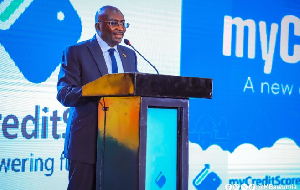 Vice President, Dr. Mahamudu Bawumia
Vice President, Dr. Mahamudu Bawumia
Dr. Michael Kyeremanteng, the National Deputy Secretary for the ‘Bawumia Identifiable Groups’ campaign team, has urged Ghanaians to consider a more impactful approach to solving the nation’s economic problems.
He said a bold solution of implementing a ‘Credit Scoring System’ is anchored on solid grounds rather than adopting a ’24-hour economy,’ with amorphous interpretations.
He made these remarks during an address to an identifiable group of artisans, entrepreneurs, market women, motor riders, and members of the National Service Personnel Association in Ho, the Volta Regional capital.
Dr. Kyeremanteng attributed the current economic downturn to the combined effects of the COVID-19 pandemic and the ongoing Russia-Ukraine conflict, which he described as a global phenomenon.
He explained that the global crisis had caused severe disruptions in business operations and economic activities, leading to the closure of several enterprises, including his own.
He shared a personal example, stating, “From 2015 to 2020, I operated around 15 hospitals in Ghana, alongside two additional facilities in Europe—one in Germany and another in Amsterdam. However, due to the economic impact of COVID-19 and the Russia-Ukraine war, I had to close more than eight of these hospitals, including one in Europe.”
According to Dr. Kyeremanteng, many countries, including those in Europe and North America, were similarly affected. However, they have managed to stabilize their economies and maintain business activities, thanks to the implementation of a robust ‘Credit Scoring System.’
Dr. Kyeremanteng emphasized that adopting a ‘Credit Scoring System’ in Ghana could revolutionize the economy by allowing citizens to access goods and services with ease, utilizing their national identity cards.
This system, he argued, would help bridge the gap between the wealthy and the less fortunate, enabling everyone to participate in economic activities.
“In European countries, people—whether rich or poor—can access what they need through a well-structured Credit Scoring System. This system empowers individuals and businesses to make purchases and gradually pay them off, improving financial inclusion and stability,” he noted.
He urged policymakers to consider this bold approach, citing it as a sustainable solution that could transform the economic landscape of Ghana, rather than relying on superficial strategies that do not address the root causes of the problem.
Dr. Kyeremanteng criticized the proposal for a ’24-hour economy’ put forward by the main opposition leader, describing it as a shallow policy that fails to address the deeper issues at hand.
He argued that many businesses and public institutions in Ghana already operated around the clock, yet there had been no significant improvement in the economic situation.
“Banks and other financial institutions already provide 24-hour services, especially with the availability of mobile interoperability, allowing customers to make transactions even at midnight. However, this has not led to any significant change in our economic situation. How, then, can the ’24-hour economy’ policy be expected to solve these problems?” he questioned.
Dr. Kyeremanteng further challenged Ghanaians, stating, “We have two leaders offering solutions to our economic problems. One is proposing a bold, effective solution—the ‘Credit Scoring System.’ The other is offering a shallow fix with the ’24-hour economy’ policy. It is now up to you, the people of Ghana, to choose between the bold and the superficial.”
Dr. Kyeremanteng’s critique of the ’24-hour economy’ policy underscored the need for deeper, systemic solutions that go beyond increasing operational hours and instead focus on financial inclusion and stability.
Mr. Alfred Believe Ahiatsi, the Volta Regional Coordinator for the Identifiable Groups campaign team, also spoke at the event.
He emphasized that the meeting was organized to provide a platform for the youth to voice their concerns and challenges in their various fields of work.
The goal, he noted, was to gather feedback and identify viable solutions that could be implemented to support their economic activities.
In conclusion, the call to adopt a ‘Credit Scoring System’ as a key strategy for economic reform presents a bold vision for addressing the structural issues facing Ghana’s economy.
